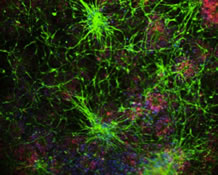Columbia University
Irving Medical Center
Neurological Institute
710 West 168th Street, 3rd floor
(212) 305-1818
TaubCONNECT Research Perspectives:
August 2017

Ottavio Arancio, MD, PhD
Tau protein is the main component of neurofibrillary tangles that constitute one of the histological markers of Alzheimer's disease (AD). Recently, more attention has been focused on the cleavage of tau by caspases: a unique family of enzymes involved in programmed cell death that are known to play a role in the disease process associated with AD. In particular, caspases have been shown to cleave tau and form a fragment known as Delta-tau that has been suggested to be one of the main seeds for the formation of neurofibrillary tangles. This mechanism has been proposed as one of the early events occurring in AD brains, in response to the toxic modulation of beta-amyloid, another key protein in the disease. According to this scenario, Delta-tau favors tau aggregation in insoluble intracellular deposits.
The Taub Institute laboratory of Dr. Ottavio Arancio participated in a study, led by Dr. Luciano D'Adamio at Albert Einstein, aimed at elucidating the function of Delta-tau by generating a mouse model in which endogenous tau cannot be cleaved by caspases and, subsequently, cannot produce Delta-tau. Interestingly, when tested for memory, the mice exhibited a clear mnemonic deficit. This defect was corroborated by a deficit in synaptic plasticity while biochemical analyses detected increased levels of tau protein and phosphorylated tau in the brain.
Collectively, the data from this work, recently published online in Translational Psychiatry, suggests a new role for the site of cleavage of tau by caspases. Rather than being a pathogenic factor in AD, this cleavage may represent a negative feed-back mechanism to prevent formation of toxic tau species in neurons of cerebral areas essential for the cognitive functions compromised in AD patients.
Ottavio Arancio, MD, PhD
Professor of Pathology and Cell Biology (in the Taub Institute)
oa1@cumc.columbia.edu

Nikolaos Scarmeas, MD
Nutrition is a modifiable factor that has been consistently associated with cognition. Due to the complex biological interactions between different components of a diet, it has been proposed that the use of a whole-diet approach and the study of specific dietary patterns (rather than focusing on specific nutrients, foods or food ingredients) may provide advantages in understanding the role of diet in chronic diseases, including cognitive impairment in the elderly.
The Mediterranean Diet (MEDI) is such a dietary pattern and it is characterized by high intake of fish, vegetables, legumes, fruits, cereals, unsaturated fatty acids (mostly monounsaturated derived from olive oil), low intake of dairy products, meat, saturated fatty acids and a regular but moderate amount of ethanol (usually in the form of wine during meals). In 2006, Dr. Nikolaos Scarmeas and colleagues first demonstrated an association between higher MEDI adherence and lower dementia/AD/cognitive decline rates in the WHICAP population in Northern Manhattan. A similar, potentially protective role for the MEDI has been demonstrated by many cross-sectional and prospective epidemiological studies since, as well as one clinical trial and some meta-analyses.
Although it may seem incongruous, associations between adherence to the MEDI and cognitive performance have been only minimally studied in Mediterranean populations. Such studies are important, not only for external validity and generalization purposes but also because it is imperative to explore associations between cognition and truly higher levels of adherence to MEDI in countries where the prototypical form of the diet is followed.
The present study, recently published in PLOS ONE, provides a comprehensive analysis on the relationship between MEDI and its components, and detailed cognitive function (evaluated with methods similar to our WHICAP population) in a representative Greek population of aged adults, a population with an overall, life-long Mediterranean lifestyle. Among 1,865 individuals, aged 73┬▒6 years, 90 were diagnosed with dementia and 223 with mild cognitive impairment. The odds for dementia was 65% lower for the individuals in the higher quartile of MEDI adherence, compared to those in the lowest one. Adherence to the MEDI was also associated with better performance in memory, language, visual-spatial and the composite score of cognitive domains, the associations being stronger for memory. Certain individual components of the MEDI (i.e. higher fish and non-refined cereal consumption) were also associated with lower dementia odds and better cognitive performance.
In summary, these findings suggest that MEDI in its a priori constructed prototype form may have cognitive benefits in traditional Mediterranean populations.
Nikolaos Scarmeas, MD
Associate Professor of Neurology (in the Taub Institute and Gertrude H. Sergievsky Center)
ns257@cumc.columbia.edu

